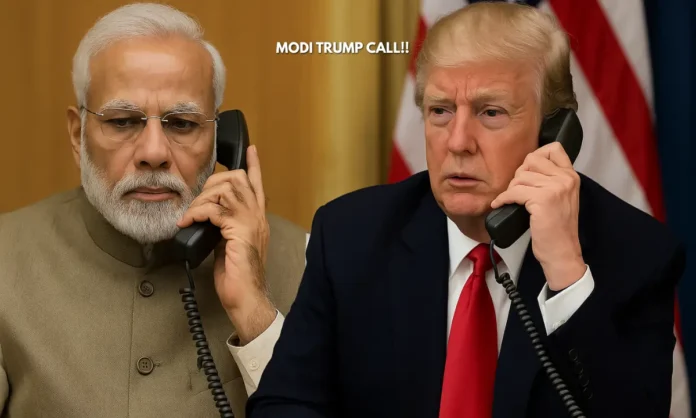Summary
- PM Modi told President Trump that India views terrorism as war—not proxy war—and Operation Sindoor is far from over.
- He firmly rejected any US role in mediating between India and Pakistan, reaffirming New Delhi’s longstanding stance.
- Modi declined Trump’s request for an in-person stopover, citing pre-scheduled commitments, signaling diplomatic firmness.
What Modi Really Told Trump: Behind the 35-Minute Call Amid Pahalgam Fallout
On June 18, Prime Minister Narendra Modi and former US President Donald Trump spoke for 35 minutes in what sources describe as a strategically timed conversation. The call came just hours before Trump’s controversial meeting with Pakistan’s Army Chief and days after the G7 Summit in Canada, where the two leaders were expected—but failed—to meet face to face.
This wasn’t just catch-up diplomacy. The timing, tone, and content of Modi’s message reflect a critical recalibration in India’s global narrative following the Pahalgam terror attack and Operation Sindoor, the retaliatory campaign that has since escalated into a full-spectrum international signal of resolve. Modi used this call to not only draw red lines for Trump but also reshape the contours of Washington’s future engagement in the subcontinent.
🚨 Clear messages to Rahul Gandhi and Pakistan.
— 𝓟𝓻𝓲𝔂𝓪𝓷𝓴𝓪 𝓜 𝓜𝓲𝓼𝓱𝓻𝓪 (@soulfulgirlll) June 18, 2025
🔹️Prime Minister Narendra Modi has firmly told US President Donald Trump that India never accepted third-party mediation and will never accept it to resolve issues with Pakistan.
🔹️Modiji conveyed to Trump that there were no… pic.twitter.com/8XZMGaQdks
“Bullet for a Bullet”: Modi Redefines India’s Anti-Terror Doctrine
- Modi told Trump that Operation Sindoor was not over, and terrorism is now treated as full-scale war, not merely a proxy front.
- He emphasized that the world has witnessed India’s will to strike back, referencing India’s diplomatic blitz across 33 capitals.
- The conversation was intended to dissuade any soft-pedaling by the US ahead of Trump’s meeting with Pakistan’s top brass.
Modi’s call was, in essence, a message to both Trump and Rawalpindi: India will not be restrained, not even by old allies. The assertion that “terrorism is no longer a proxy war” signals a departure from the semantics of past Indian foreign policy—no longer treating terror attacks as sporadic events but framing them within the vocabulary of war.
Modi’s reference to the seven all-party delegations sent worldwide following Operation Sindoor underscored New Delhi’s strategic ambition: to elevate the narrative of Indian retaliation from regional optics to global legitimacy.
India Refuses Mediation—Again, Unequivocally
- Modi categorically told Trump that India rejects any form of US mediation on Kashmir or peace talks with Pakistan.
- He clarified that no such topic was discussed at any level, countering speculation of American diplomatic brokerage.
- Direct talks—where they exist—occurred only between the Indian and Pakistani militaries and only at Pakistan’s request.
India’s refusal of mediation isn’t new—but the fact that Modi raised it unprompted suggests concern over backchannel narratives. With Trump poised to meet Pakistan’s Army Chief, New Delhi anticipated diplomatic ambiguity and worked to preempt it.
The firm rejection of third-party involvement reasserts India’s long-standing red line on sovereignty, but with a sharper edge. It was also likely a preemptive rebuttal to any Pakistani claim during Trump’s upcoming interaction with General Munir.
Trump’s Invitation, Modi’s Refusal: A Subtle Signal of Power Balance
- Trump invited Modi to stop by the US on his way back from Canada. Modi declined due to prior commitments.
- The refusal, though courteous, served as a strategic signal of India’s growing diplomatic self-confidence.
- With Modi riding a post-Operation Sindoor wave of international support, the power dynamic in the relationship has shifted.
In years past, an impromptu invitation from a US President—especially Trump—would be diplomatically irresistible. But 2025 isn’t 2019. Modi’s refusal wasn’t just about scheduling; it was about signalling parity.
The message was clear: India no longer plays the role of a regional junior partner, and high-stakes decisions won’t be made on the sidelines or over casual stopovers. Modi’s strategic “no” reminded Washington that its influence in South Asia now flows through dialogue, not dominance.
Between Airstrikes and Alliances: India’s Evolving Posture with the U.S.
India’s post-Pahalgam diplomacy marks a decisive shift. It no longer waits to react—it dictates timing, controls optics, and preempts narratives. The call with Trump was not simply about affirming bilateral ties but about drawing diplomatic boundaries while affirming military resolve.
Washington’s response to India’s Operation Sindoor has been measured but supportive. Yet Modi’s phone call suggests that India doesn’t intend to be “managed” during a moment of regional escalation. Instead, it wants Washington to align with its strategic vision—or at least not interfere.
In declining a stopover and rebuffing mediation, Modi asserted something more than independence—he asserted agency.


